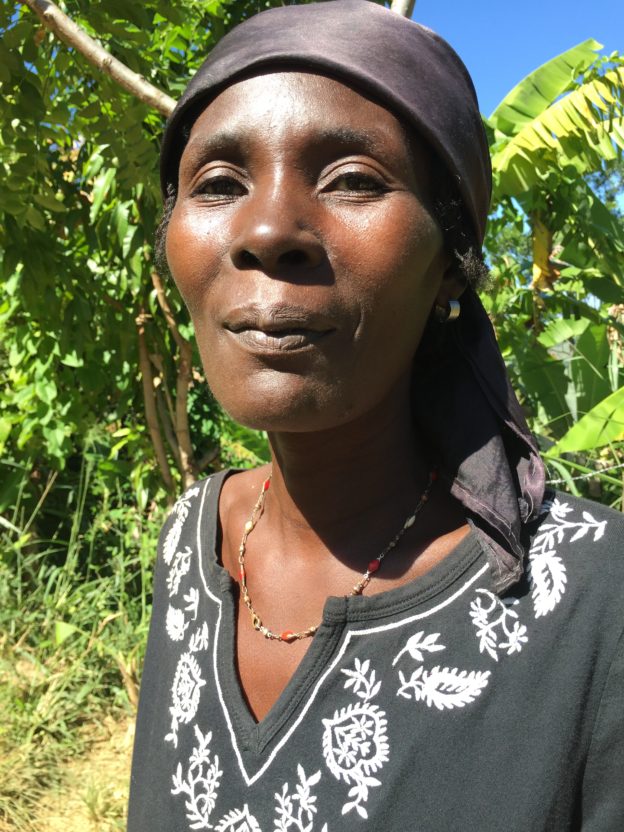“Things aren’t moving the way I’d like them to, but they’re moving,” Laumène explains. She’s been struggling with headaches that she still prefers to address with folk remedies, but she continues to work through it all.
Two of the children who still depend on her are in school this year. A third would be in school, but he got sick right at the beginning of the year, and he went to stay with an older sister in Port au Prince, who is helping him get treatment. Laumène plans to send him in school starting in January. Another lives in Port au Prince as well, even though his mother thinks of him as her dependent. Her real difficulty is with Elijean.
Elijean is 15, and lives with his mother in Gwo Labou. She and the boy’s father sent Elijean to preschool, and Laumène still shows off his diploma with pride. But then the father decided not to pay for the boy to go to primary school. After a couple of lost years, Laumène herself managed to send Elijean. But it was always a struggle. Sometimes she couldn’t pay fees on time, sometimes she couldn’t buy all the books he’d need, and sometimes she couldn’t afford a decent pair of shoes. He would miss time. And the more time he missed, the less interested he became.
Now that Laumène could send him he’s no longer willing to go. He prefers to hang around and make little bits of money doing odd jobs. The day I sat with Laumène, for example, I crossed paths with Elijean as I was hiking up the hill to her home. He was lugging a sack full of avocados down the mountain for a neighbor. Laumène worries that Elijean will regret his decision someday. “He’ll see the other young people and the progress they’re able to make.” But she hasn’t been able to get him to change his mind so far.
She’s unhappy that her small commerce disappeared. She thinks she was forcing it to do too much for her and her children. “Their father gives them nothing. I’m not his wife.” She started the commerce with money she borrowed from her Savings and Loan Association. She used earnings from it to buy shares at the Association’s weekly meetings. She took some of the money to register three of her kids for school, used 400 gourds to send her boy to his sister in Port au Prince, and a little over 1000 to repay the loan. She has about 500 gourds left, but that’s not enough to stay in the business she had.
“I want to set up a rum business, but it’s better if I do it with my own money.” Locally produced rum sells reliably, with a healthy profit margin, because it’s cheap. But she’s worried that if she tries to do it with another loan, she could have problems because drinkers often buy on credit, and you can lack cash when you need it to buy a new supply or make a loan payment. So, she’s waiting for her bean harvest. It should provide her plenty of money to get started.
In the meantime, she’s happy about the way that her poultry are multiplying. She has chickens, ducks, and turkeys of various sizes running around her yard. Several are sitting on eggs. She had none when she joined the program. In the absence of her commerce, they give her a reliable way to manage smaller expenses, the sort for which she wouldn’t want to sell off a goat. And the turkeys in particular can help her increase her wealth. Large ones can sell for over 1000 gourds. Selling a couple of large turkeys can bring in enough to buy good young goat.
She’s made some progress with her goats. She started with just two, and now she has four, three mature females and a kid. But the kid has been sick. The other kid from the same litter died already. Their mother hasn’t wanted to let them nurse.
Laumène is doing everything she knows how to do to save the kid. She holds its mother at times to help it nurse, and she bathes it and encourages it to start eating regular food, but she’s pessimistic about its chances. Her hopes focus instead on the other two females, both of which are pregnant.
Her larger concern related to the goats is theft. Theft of livestock in the area around Gwo Labou has become an epidemic. A gang of thieves appears to be making the rounds at night. Laumène calls me to a secluded spot in her yard, right in front of the door to her house, and she whispers that she’s started bringing the goats into her home at night. “They smell, but I’ll put up with it to protect them.” She explains that she bought some extra cleaner so she can to go over the room they spend the night in every morning, and she proudly shows me the room, asking me whether I see or smell any sign of them. She also decided to leave her goat shed in place, even though it needs repairs, so that thieves won’t come look in her home.
